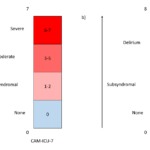Christina Boncyk, MD, MPH Assistant Professor of Anesthesiology, Vanderbilt University Medical Center, Nashville, TN The generally positive results of older controlled studies evaluating antipsychotics for intensive care unit (ICU) delirium treatment helped potentiate the routine use of these agents in critically ill adults despite the serious limitations of these studies.1-3 While more recent publications of […]
Category Archives: Delirium Research
Using Limited Lead Rapid Response EEG to Detect Delirium: A Proof-of-Concept Study
Malissa Mulkey, PhD, APRN, CCNS, CCRN Post-Doctoral Research Fellow, Indiana University Medical Center, Indianapolis, IN Based on the Diagnostic and Statistical Manual for Mental Disorders-Version 5 (DSM-V) delirium is defined as encompassing a reduction in attention, impairment in both cognition and memory and awareness.1 Historically, due to the high prevalence in the intensive care setting, […]
Do more complex brain electrical signals protect against postoperative delirium?
Leah Acker, MD, PhD, Assistant Professor of Anesthesiology, Duke University Medical Center, Durham, NC Outside of the delirium field, less complex physiological output signals often are associated with increased risk of geriatric syndromes. For example, an increased risk of falls is associated with less complex musculoskeletal adjustment movements.1 Overall, less complex physiological signals are associated […]
Does Treating Incident ICU Delirium with Haloperidol Improve Outcomes?
Matthew S. Duprey, PharmD, PhD, BCCCP Investigator, Department of Health Services, Policy, and Practice, Brown University School of Public Health Practitioners familiar with delirium and its consequences have long sought a medication-based treatment to reduce its severity and duration in hospital and also improve post-hospitalization outcomes including long-term cognitive impairment. Despite three randomized controlled trials […]
Answers to some Frequently-Asked-Questions about the NIDUS II Pilot Awards
[updated 10/6/22] Applications for the 2023 NIDUS II Pilot Grant Awards are due Friday, May 5, 2023, 5:00PM EST. We have compiled responses to some NIDUS II Pilot Grant FAQs here to help assist applicants during the process. If you have additional questions or would like further clarification, then please contact NIDUS@hsl.harvard.edu. Also, applicants may […]
Frailty, Postoperative Delirium and Cognitive Dysfunction: Where is the Association?
Contributed by Elizabeth Mahanna-Gabrielli, MD Department of Anesthesiology, Miller School of Medicine, University of Miami, Miami, Florida As a neuroanesthesiologist and intensivist, I’ve seen many frail patients come into the operating room and intensive care unit. During the early years of my career, frailty was informally defined as patient who was elderly, weak, and deconditioned; clinicians […]
Cognitive Prehabilitation to Prevent Postoperative Delirium
Contributed by Brian O’Gara MD MPH Department of Anesthesiology, Beth Israel Deaconess Medical Center, Boston, MA Postoperative delirium occurs in 15-50% of older surgical patients, and increases the risk of postoperative complications, hospital mortality and long-term cognitive dysfunction.1 Hospital -based multicomponent interventions can prevent postoperative delirium, but these approaches are only 30-40% effective.2 Therefore, there is […]
Studying Delirium in the Neurocritical Care Unit: Improving Detection and Outcomes in Patients with Stroke
Michael Reznik, MD Assistant Professor of Neurology & Neurosurgery. Brown University, Alpert Medical School I’ve been interested in brain science, consciousness, and cognition for as long as I can remember, and it was through the lens of these interests that I opted to pursue a career in neurology. I found myself especially interested in patients […]
Discordance between ICDSC and CAM-ICU-7 as measures of delirium severity in the ICU
Karla D. Krewulak PhD and Kirsten M. Fiest PhD Department of Critical Care Medicine, University of Calgary, Calgary, AB, Canada Determination of delirium presence or absence may no longer be sufficient when tools exist to measure a delirium score which may be used to estimate delirium severity. Measurement of delirium severity has been identified as […]
Does Sleep Deprivation Cause Delirium? Exploring the Physiologic Links
Contributed by Shawniqua Williams Roberson, M.Eng., M.D., Departments of Neurology and Biomedical Engineering, Vanderbilt University Medical Center, Nashville, TN. Dr. Williams is a graduate of the 2019 NIDUS Bootcamp. Many of us are familiar with the feeling of not getting enough sleep. Perhaps a storm rattled the windows all night, or the baby couldn’t stop crying. […]








